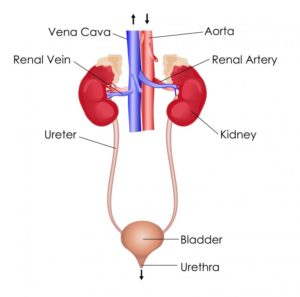10 risk factors for CKD
Keep track of your kidney data with PKB
First of all, how common is CKD (chronic kidney disease)?
CKD is common, affecting around 1 in 10 of the population. Fortunately only 1 in 100 of them (i.e. 1 in 1000 of the population) go on to need dialysis or a kidney transplant.
So. What are the 10 risk factors for CKD?
- Age
- Race
- Smoking
- Gender
- Family history
- Acute kidney injury (AKI) episode(s)
Possible risk factors - Obesity
- Socioeconomic status
- Hypertension
- Cardiovascular (heart) disease.
10 risk factors for CKD

- Age. The older you get, the more likely you are to have some degree of kidney disease:
- 10% of the population have CKD
- But over 75 years, CKD is present in 50% people – in many of them it is an age-related issue and not usually a disease
- It is less common in young adults, being present in 2% of people
- The average age range of starting dialysis – which is not common, affecting about 1 in 1000 of the population – is 60-65 years old.
- Race. CKD is more common in people of South Asian origin (those from India, Bangladesh, Sri Lanka and Pakistan) and Black people than the general population. The reasons for this are unclear but there are also higher rates of diabetes and high blood pressure in South Asian and Black people
- Smoking. It is more common in smokers (perhaps as this causes renovascular disease, RVD)
- Gender. This is complicated and not fully understood. Women are more likely to get CKD. But men are more likely to suffer kidney failure (bad CKD, ie Stage 5) – as assessed by rates of dialysis and kidney transplantation.
- Family history. There is a higher likelihood of advanced CKD (CKD4 or CKD5) if you have a parent or grandparent on dialysis or with a kidney transplant. This is a general phenomenon not just based on known inherited diseases like polycystic kidney disease (PCKD) and Alport Syndrome
- Acute kidney injury (AKI) episode(s). One or more AKI episodes in the past increase the likelihood of long-term CKD.
Possible risk factors for CKD
It is unclear whether the following 4 risk factors are independent ones – i.e. they may be a risk factor as they are linked to a known cause of CKD. Obesity is a good example of this possibility.
- Obesity – probably as it makes Type 2 diabetes more common (a cause of 30% of CKD). It is also a risk factor for FSGS, a type of chronic glomerulonephritis and known cause of CKD
- Socioeconomic status – may be a risk factor for CKD – it is determined by income, occupation, education, wealth, and housing. An income <£12,000 per year, compared with income £18,000, has been shown to be associated with 2.5-fold increase in CKD (Krop, 1999)
- Hypertension (high blood pressure). Whether hypertension is a genuine risk factor is uncertain. As it is a very common clinical feature and complication of CKD, it is seen with CKD – but may be true risk factor. But mild/moderate essential (i.e. of unknown cause) hypertension does not cause CKD. But accelerated hypertension can cause CKD, and AKI
- Cardiovascular (heart) disease – especially heart failure (CHF). 30% of the output from the heart goes to the kidneys, so they are intrinsically related. So when the heart does not work properly, neither will the kidneys – and vice versa.
More newly described risk factors for CKD
These also should be considered possible risk factors.
- Obstructive sleep apnoea (OSA) – is a disease associated with complete and partial breathing disturbances during sleep for at least five events per hour. In one study, 30% of obstructive sleep apnoea patients had CKD (Mirrakhimov, 2012)
- Dental disease – perhaps caused by gram-negative microbial biofilms has been suggested as a risk factor CKD
- Urate – a slightly elevated uric acid level has been associated with 2-fold risk for CKD
- Exposure to crude oil and hydrocarbons – chronic exposure to crude oil and hydrocarbons may be linked with the development of CKD (Okoye, 2019); however, this should not be interpreted as evidence for causality. Other researchers have reported similar findings, although some researchers had contradictory findings.
Risk factor vs cause (disease)
It is important to distinguish what is an (epidemiological) risk factor, and what is a cause (i.e. a disease, like diabetic nephropathy caused by diabetes). So the risk factors outlined above apply to all diagnoses/causes. This is why diabetes is not in the list above.
The phrase ‘chronic kidney disease’
Also. Even though CKD is an abbreviation for Chronic Kidney Disease, for many people at the less severe end of the CKD classification (CKD1+2, and CKD3a), it is really a risk factor (like hyperlipidaemia for IHD) for a syndrome (see below), not a disease itself. Being told you have CKD3 can be scary. It needs to be explained and put into perspective by your doctor.
Syndrome not diagnosis (cause)
It is also important to note that CKD – at whatever level, CKD to CKD5 – is not a diagnosis. It is a syndrome (this means a group of diseases/causes that present in a similar way) with:
- Risk factors outlined above
- Diagnoses – i.e. diseases that cause it. For example, as stated above, diabetes is a cause not a risk factor, as it causes diabetic nephropathy.
In this way the ‘disease’ part of the word ‘CKD’ is not exactly true. In many ways it should have been called ‘Chronic Kidney Syndrome’ (more like ‘Acute Coronary Syndrome, ACS, which has causes, e.g. unstable angina).
Summary
We have described 10 risk factors for CKD – they may not all be genuinely independent. We hope it has been helpful.
Other resource
This is a good review article: Kazancioğlu, 2013.
Last Reviewed on 4 April 2024
